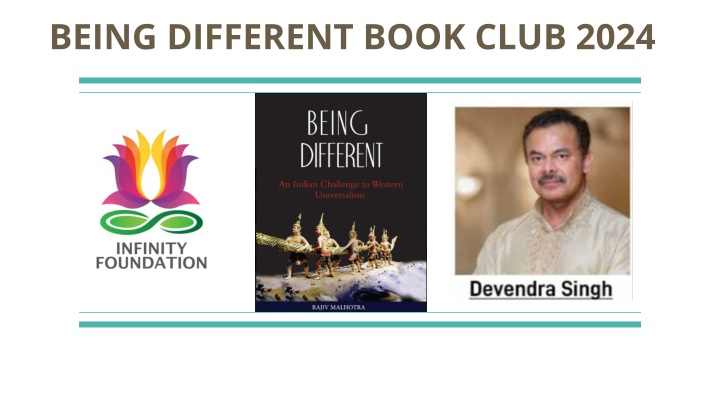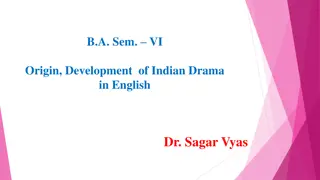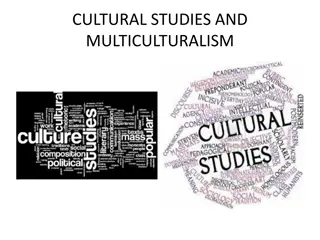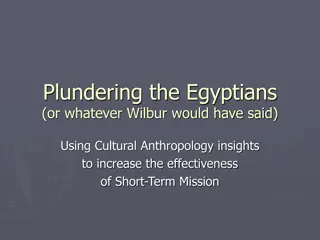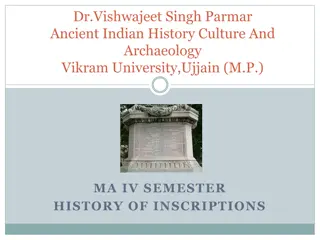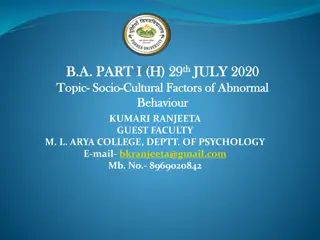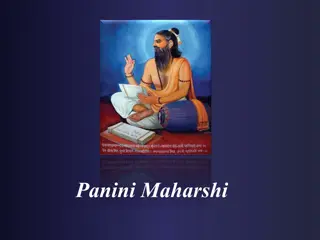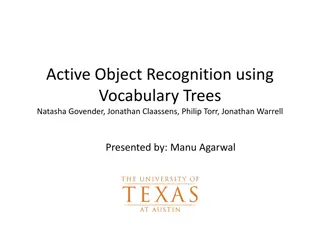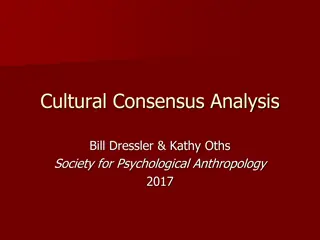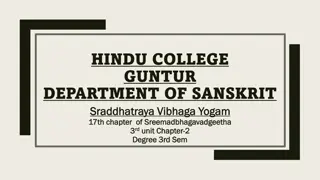The Uniqueness of Sanskrit: A Cultural Journey Through Non-Translatability
Explore the depth of Sanskrit language and culture, delving into the significance of non-translatability. Discover how Sanskrit mantras hold the essence of creation and resistance against colonization, emphasizing the vibrational power within. Immerse yourself in the holistic experience of ancient wisdom and cultural preservation.
Download Presentation

Please find below an Image/Link to download the presentation.
The content on the website is provided AS IS for your information and personal use only. It may not be sold, licensed, or shared on other websites without obtaining consent from the author.If you encounter any issues during the download, it is possible that the publisher has removed the file from their server.
You are allowed to download the files provided on this website for personal or commercial use, subject to the condition that they are used lawfully. All files are the property of their respective owners.
The content on the website is provided AS IS for your information and personal use only. It may not be sold, licensed, or shared on other websites without obtaining consent from the author.
E N D
Presentation Transcript
Non-translatable Sanskrit vs Digestion Many Westerners assume Sanskrit language can be translated into other languages and imported into other paradigms The richness in the meaning of a word is deeply embedded in its cultural context A culture consists of the cumulative collective experience To understand a culture is to live in it The unique experiences of different cultures are not interchangeable Primordial vibrations comprise all reality Vibrations are the heartbeat of the cosmos
Non-translatable Sanskrit vs Digestion The reverberations from this cosmic pulsing constitute the alphabets of Sanskrit Rishi s extraordinary faculties enable him to experience directly the vibrations of the infinite and the objects to which correspond The rishi does not compose hymns, but hears them or tunes into them These hymns are called Mantras. Their very nature as sound makes them non- translatable No external word can fully communicate the experience the experience of the heat and pain that fire can cause The word burn offers only a conceptual name for fire, not an experiential one
Non-translatable Sanskrit vs Digestion The purpose of Sanskrit mantra lies in the effect it creates An object can sometimes have more than ten different names, but the seed vibration (bija-mantra) remains unchanged Therefore, if one is attuned to seed vibration, one achieves a complete understanding of it Shrimad Bhagwat explains the unmanifest Aum and how its manifestation brings about the Vedas and all of creation The mantra is sown in the person and produces effects much like a seed evolves into a tree
Non-translatable Sanskrit vs Digestion When repeated, it vibrates in every part of the practitioner s being and recreates within him the original reality from whence it came Non-translatability of key Sanskrit words attests to the non- digestibility of many Bhartiya traditions Holding on to the Sanskrit terms becomes a way of resisting colonization and safeguarding dharmic knowledge
Brahman and Ishwar is NOT God The word Brahman comes from the root brih , which means to expand The all-expansive ultimate reality which creates all, lives in all, and transcends all in Brahman To translate it as God diminishes its meaning Judeo-Christian God is the creator of the universe, separate from it Furthermore, this God is authoritative, punishes those who transgress rules, and intervenes in history at specific times and places
Brahman and Ishwar is NOT God Brahman, on the other hand is the cosmos and resides in each one of us, unrealized as Atman, making us ultimately Brahman The idea of non-dual unity with God is absent in Western faith In the same way, the term Ishwar is not the same as Judeo-Christian notion of God Ishwar has countless forms of manifestation depending on everyone's choice (Ishta- devata) The terms Brahman, Ishwar, Brahma, Vishnu, Shiva, Devi, etc., have rich implications, which are different from one another These terms cannot be collapsed into a monolithic concept of God
Shiva is NOT Destroyer Shiva can best be described as a transformer who moves humanity and the universe forward in the evolution of consciousness The transformation brought by Shiva is a deconstruction process The physical and material dissolution may be seen as the end of the cycle, making room for fresh manifestation Spring to Summer Shiva is also described as the lord of dance and of Yoga, and this is why he inspires so much more devotion than if he were thought simply as destroyer
Atman is NOT Soul or Spirit In dharma philosophy, the true nature is sat-chit-Ananda, which can be realized through adhyatma-vidya In the West, the self is conceived as sinful, a condition which can be alleviated only by belief in a set of history-centric revelations Atman reflects the Supreme, and as such, differs from the Judeo-Christian concept of Soul or Spirit If Original Sin was replaced by Karma and reincarnation, the entire history-centric enterprise would collapse, also Heaven and Hell Reincarnation and Karma is the idea of infinite time, with no beginning of end Western faiths are based on finite time, with a beginning and an end
Atman is NOT Soul or Spirit Western notion of order are derived from a belief in finite entities Atman is without beginning or end, which is not true of Western Soul In West, the eternal spirit (holy ghost) is within God, and Jesus spirit is co-eternal with God, but the individual soul exists in finite time In dharmic system, the Atman resides not only in humans, but also in animals, plants and all creatures That s why in dharmic system, there is a respect for animals, plants While there have been sporadic animal rights movements in Christianity, such movements are not intrinsic to Christian metaphysics The Bible says that God gave mankind dominion over plants and animals
Vedas are NOT Bible or Gospel The word Bible is used to refer to the sacred scriptures of other traditions This refers to a closed canon of history-centric texts, which are normative and authentic teachings of Christianity From the Vedic point of view, the Bible is like Smriti, and not Shruti (direct enlightenment experience) Bible entirely consists of third-party accounts (what x said to y)
Dharma is NOT Religion or Law Dharma has the Sanskrit root dhri, which means that upholds Religion 1. Involves worship of the divine who is distinct from us and the cosmos 2. Is based on a single canon of scripture given by God 3. Is governed by the authority of Church 4. Consist of formal members 5. Is presided over by an ordained clergyman 6. Uses a standard set of rituals
Dharma is NOT Religion or Law Equating dharma with the God creates distortion because dharma is not limited to any creed, or specific form of worship Dharma provides the principles of harmonious fulfillment of life Artha, Kama, Moksha Religion, then, is only one subset of dharmic range of meanings Religion applies only to humans and not to the entire cosmos There is no religion of electrons, monkeys, plants, and galaxies, whereas all of them have their dharma
Dharma is NOT Religion or Law Dharma cannot be translated as law , because for law a set of rules must be present, and these rules must; 1. be promulgated and decreed by an authority 2. be obligatory 3. be interpreted, adjugated, and enforced 4. carry penalties when the law is breached The reduction of dharma to the concepts of religion and law has harmful consequences; 1. It places the study of dharma in Western hands 2. It creates the false impression that dharma is like Christian law making and struggle for State power
Jati and varna are NOT Caste Jati is best understood in the sense of a set, as in mathematics of a genre in music It applies to non-human entities as well, e.g., Jati of trees, Jati or verbs In human context, a nation is a Jati A given religious group is a Jati, military a Jati The word Varna means color. It also refers to the various personalities and qualities of people An individual s varna is based on past karma
Aum is NOT Amen, Allah, Etc. The mantric aspect of Aum cannot be replaced by synonyms Aum is the vibration of Ishwar, unmediated by the conditioned mind Patanjali called Aum a spokesperson of Ishwar Hence, the experience it brings about cannot be generated by an alternate sound In 2007, Baba Ramdev said one can say Amin, Allah, or Jesus when meditating But he missed the point. Electricity is a universal force, but one can t substitute positive pole for the negative pole, or replace copper wire with another wire Replacing one bija-mantra with another arbitrary sound changing the inputs, and would naturally mean a change in output Aum practice is designed to dissolve Nama Rupa from the mind Jesus and Allah are proper nouns laden with historical context
Dukkha is NOT Suffering Dharma traditions say that the source of human problems in incorrect cognition and understanding, which is the result of our conditioning This is why we see the world with notions of separation, which we insist are real Believing the world to be dualistic leads to Dukkha The inability of the Western religions to realize integral unity between human and divine is due to their insistence on absolute dualism The ego lives dualistically to pursue objectives, satisfy cravings, and avoid what it dislikes, even though these goals are unsustainable Their non-existence as separate entities is unacceptable to the ego, because that would make ego s quest futile
Dukkha is NOT Suffering The ego pursuits, then, serve to feed and strengthen the ego itself Dharmic system require the individual the individual to undergo a radical cognitive shift to rise above dualism So, the desire for the particular ceases The value West places on freedom is superior to anything Since, in West, the self-existence and autonomy of self is an illusion, it can never feel free enough Moksha, Mukti, Nirvana, etc. are alternatives of freedom
Jesus is NOT Avatar Christians believe that Jesus alone shares complete identity with God Attempts are often made to describe Jesus an Avatar Avatar means descent into visible form to lead us to a higher stage of perfection Each Avatar comes to establish the eternal truth anew in response to the need of time Christianity claims exclusivity that Jesus was the only incarnation Avatars do not serve as intermediaries chosen by God
Holy Spirit is NOT Shakti or Kundalini Supreme being uses its creative power (shakti) to manifest the universe Sophisticated rituals and meditations create an awareness of and unification with the sacred presence of Shakti in everything Yantra consists of upward and downward pointing triangles that represent the ascending and descending movements of Shakti In Christianity, there is emphasis from above or outside the self Unlike Shakti, the Holy Spirit is not seen as the essence of human selfhood or the essence of cosmos Shakti is always in our physical body Kundalini is a psycho-spiritual concentration of Shakti
Holy Spirit is NOT Shakti or Kundalini Numerous spiritual techniques can arouse Kundalini and channel it upward through the Chakras In Hinduism, there is no evil spirit or demonic Shakti Unlike Shakti, the Holy Spirit is not experienced as one s inner essence It manifests by an external force invoked by communal prayer to enter and dwell within Evangelists have launched a major campaign in which Virgin Mary is used as a substitute for the Hindu Goddess Hindu Goddess (Mahadevi) includes all forms such as Durga, Kali, Lakshmi, Saraswati, Ambika, and Uma
Prophet or Christian Saint is NOT Rishi, Guru, Yogi Saint carries specific connotations in Roman Catholic It refers to someone dead and fully redeemed in heaven Most of the early ones were martyred while spreading Christianity They are not recognized for any advancement of consciousness Sainthood does not imply any specific experiential attainment of what in Sanskrit would be called Siddhis In Abrahamic religions, identity and unity with the divine is ruled out
Prophet or Christian Saint is NOT Rishi, Guru, Yogi They say that God s supremacy can never be achieved by human being A prophet is not a Guru in the sense of someone who guides an individual towards the state of liberation Prophet is also not a Rishi, who embodies unity with universal consciousness Prophet is also not a Jivanmukta, who lives in full liberation A prophet is someone through whom God chooses to communicate divine will on earth He is strictly a mouthpiece of God
Devatas are NOT Pagan Gods Paganism and Polytheism are associated with religions that were demonized and demolished by Church As Christianity evolved and spread, it assimilated many pagan and polytheistic practices , symbols, and ideas and gave them new spin The Christmas tree was borrowed from indigenous cults in Germany Image of Mary and the infant Jesus was modelled on the image of mother and child in the cult of Isis in Egypt Traditions of Easter, such as egg decoration and the symbol of rabbit came from pre-Christian fertility rituals Many Pre-Christian feasts and holidays got included in the Christian calendar, and religious sites were reclassified in Christian terms as part of Christian history
Devatas are NOT Pagan Gods This resulted in the disappearance of paganism and the strengthening of Christianity Christianity did not adopt the pluralism of pagan traditions, but retained its exclusivity Devatas in Hinduism are forms of the One Supreme Being Devatas are Shakti personified both as external cosmic divinities and as internal divinities within us The inner Devatas are the divine virtues we are to discover In Hinduism, different Devatas represent different powers of the same reality Therefore, one cannot replace one Devata with another arbitrarily
Idols Are NOT Murtis The term idol is loaded with demonic connotations in the Abrahamic religions The term refers to the graven images of false gods to which sacrifices were made in return for privileges and benefits In Christianity, true worship can only be to God Icons are objects of reverence and not worship
Idols Are NOT Murtis What Christians revere are icons and what pagans' worship are idols Murti means awakened, real, and expressive of the Divine Spirit Pran-Prathistha is meant to lead to a deeper and less visually dependent way of approaching the divine The ritual of Visarjan at the conclusion of a festival symbolizes non- attachment It is not to the stone, but to the divine person figured in the stone that the prayer is offered
Yajna is NOT Christian Sacrifice In western view, human beings are incapable of atonement, so God sent his only son as sacrifice to spare humanity This sacrifice was done once and for all , and it s not to be repeated Martyrdom (~sacrifice) in Christianity is a dangerous concept that encourages violent death as a means to heaven The notion of Jihad is the extreme version of sacrifice Western scholars wrongly equate sacrifice in the Christian sense with the Sanskrit term Yajna
Yajna is NOT Christian Sacrifice Yajna is the thread that binds humanity to the devatas Bhagwat Gita says the devatas nurture us and we must nurture them The essential principle behind Yajna is the pouring out of one s life for the benefits of others This is indeed part of the sacrifice inherent in the physical world Mineral in the earth nourish plant life Smaller plants die and form the organic manure for trees Plants are consumed by animals for their own sustenance
Yajna is NOT Christian Sacrifice Yajna is also a process that connects manifest with the un-manifest Bhartiyas also did sacrifice their lives in ways that resemble the martyrs of the West (albeit not in the same sense) Rajput women committed Jauhar to protect their honor This can be viewed as defensive martyrdom at best In contrast with the Western history of martyrdom, these were sporadic, isolated incidents They were not part of a strategy of expansion or aggression They were not centralized or systematic encouragement of martyrdom
Yajna is NOT Christian Sacrifice Martyrdom was raised to a cult in Christendom, not in Bharat A certain notion of sacrifice is a key element of Yajna, some connotations associated with Western sacrifice are not applicable Bhartiya cosmology describes existence on three levels; unmanifest, manifest as cosmic, and manifest as individual The other ritual is one s inner sacrifice to devatas, who are within us as power of consciousness and outside as cosmic forces The Vedic path is of surrender one s physical, emotional and mental actions to the divine The purpose is to counter the ego s claim to own, act, and suffer as the body-mind Yajna is a ritualistic and cognitive surrender of the ego to the fire Higher self
karma is NOT Western notion of Suffering In Christian view, suffering arises from sin, not ignorance All humans share this original sin because of the actions of Adam and Eve In dharmic view, it is the ignorance which produces the chain of cause and effect, which in turn determines suffering So, the eating the forbidden fruit would not become sin Karma is the principle by which an individual s thoughts, feelings and actions create consequences in the present and future Karma does not imply fatalism but rather a consequence for one s actions Karma is a psychological law of cause and effect This understanding is expressed by the term karma
karma is NOT Western notion of Suffering The timing of the effect is indeterminate and occurs when the appropriate fertile conditions for its exposure are in place Repeating a given Karma strengthens the Sanskar, which gradually becomes a habit The power of Sanskar is so strong that a person can fall into default mode, without being conscious of it Spiritual practice can enable one to burn the seeds of past Karma by experiencing the fruit of past Karma with surrender Karma operates only when one thinks of oneself as being separate and independent (egoistic action) Once one is no longer the doer, Karma ceases to accumulate Reincarnation is the system of rebirth based on one s own past karma
karma is NOT Redemption Although Karma is a dharmic term, it is popular in the Western vocabulary today The principle is similar, Bible says, as you sow, so shall you reap Both systems presume free will But it is compromised by original sin in Christianity, and in dharmic traditions it is inhibited by Sanskar In Western religion, justice is finally accomplished on the day of judgement; person is assigned to Heaven or Hell In Karma, there is no day of universal judgement
karma is NOT Redemption For Hindus, there are two problems with the Christian belief: 1. The Karma of a person is non-transferrable to another person 2. Phala cannot precede Karma, but always follows afterwards So, Jesus suffering could not be used either retroactively or to wipe out future Karmas by future persons In dharmic traditions, an action is finite, as are its karmic effects, even though they may play out over long periods of time
karma is NOT Redemption In Christianity, damnation is forever, and there is nothing anyone except God can do about it Bhartiya philosophy holds that time is infinite Biblical time started upon the creation of this universe and will terminate at the End Times Christians picture the cosmos as finite, followed by eternity in Heaven or Hell One can be good Hindu regardless of whether he has heard of Krishna, Rama, or Shiva, if he lives his life according to dharma In contrast, one cannot be a good Christian without knowing and accepting Jesus
karma Yoga is NOT Christian Works Works is a Christian term which is similar to Sadhana and karma Yoga in Hinduism It refers to charity to prayer, to Bible study, to participate in Christian rituals According to dharma, both personal efforts and grace are necessary to achieve the highest aim of life Grace will come when one s lower natures are surrendered Every action must be performed free from ego with no desire for reward In this way one serves as an instrument of the divine
Salvation is NOT Jivanamuktior Moksha Many evangelists ask this question when looking to convert, Have you been saved ? Your answer should be I have never been condemned to begin with Christian salvation is a solution to the problem of Eternal Damnation caused by original sin, but this problem does not exist in Hinduism Imagine someone asking you if you have been pardoned from your prison sentence Such question is absurd because you were never condemned for any crime
Salvation is NOT Jivanamuktior Moksha If a dharmic person says that he has been saved would imply that he accepts Christianity s fundamental tenet that everyone is a sinner Receiving assurance of salvation is the main goal of Christians It comes as a gift of grace, and its source lies outside the individual It does not come as a result strictly of merit or spiritual practice Full realization of salvation can come only after death Moksha refers to living in a state of freedom from ignorance, preconditioning and karmic baggage Jivanmukta has achieved Moksha, but choose to remain in the world to do the spiritual work (no Karmic baggage)
